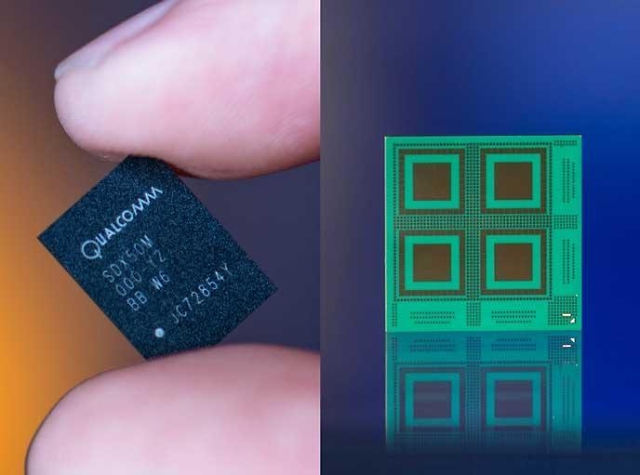
Qualcomm's next-generation 5G chipset 'X50' [Courtesy of Qualcomm]
SEOUL, Feb. 28 (Aju News) -- Driven by China's determined push to capture a future market, South Korean firms are under pressure to join forces in putting a fifth-generation (5G) mobile network into commercial operation for the first time in the world.
Collaboration was presented by South Korean policymakers as an effective way to take the upper hand in the race to commercialize 5G services when they inspected new technologies and products unveiled by Chinese and other foreign firms at the Mobile World Congress (MWC) in Barcelona, Spain.
"We will strive to achieve the goal of commercializing 5G for the first time in the world," Science and ICT Minister Yoo Young-min said Wednesday after visiting the booths of major firms. He suggested South Korea should lead the 5G market as it did in the commercialization of previous mobile networks like CDMA (Code Division Multiple Access), WCDMA and LTE (Long-Term Evolution).
At an earlier MWC keynote speech, Yoo said South Korea would start commercial operation of a 5G network in March next year and build nationwide infrastructure by 2020.
"As competition is getting fierce to take the upper hand in 5G technology, the government and telecom companies must work tirelessly to achieve the world's first commercialization of 5G mobile communication in March next year," he said Tuesday at talks with KT and other South Korean telecom companies.
His message was clear: "In order to build an efficient 5G network, it is necessary to activate the joint establishment of essential facilities and expand common use.
Competition is growing among global tech firms to accelerate the advent of a 5G digital era, but experts believe that end-to-end commercial 5G solutions can only be achieved through cross-field collaboration, referring to devices, networks, equipment and chipsets.
At Winter Olympic venues this month, KT tested its 5G commercial service for the first time in the world and collected related data. Last year, SK Telecom successfully tested self-driving automobiles using a 5G network service, exchanging real-time traffic information through its ultra high-speed network.
However, Chinese firms led by Huawei looked adamant to catch up quickly. In Barcelona, Huawei unveiled its first commercial chip called "Huawei Balong 5G01" to meet 5G standards and vowed to launch a 5G smartphone in the second half of this year.
South Korean technology firms are heavily dependent on external chipset suppliers including Qualcomm, which plans to unveil its 5G chipset, X50, next year. Qualcomm took an unimaginable amount of royalty fees from South Korean customers for using CDMA technologies and its one-chips are also irreplaceable as they are the vital part of smartphones.
One-chip is an integrated chipset which has a communication module, a CPU and other controllers built into a single board. Because it is smaller and less power consuming, the Qualcomm chip is widely used in Android smartphones which take up a 87 percent share in the global smartphone market.




